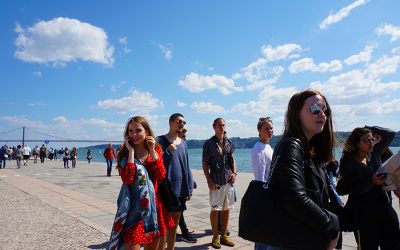Are you trying to decide between A-levels or IB?
St Clare’s was founded in 1953 as a college which specialised in A-level. As St Clare’s focused on advancing international education, in 1977 St Clare’s decided to stop teaching A Levels in favour of the then little known International Baccalaureate Diploma. We recognise the considerable advantages that the IB offers young people as they prepare for the next stage of their life.
Overview of IB and A Level
IB
- IB students take six subjects, three at higher level and three at standard level. In addition IB students must undertake three core programmes: Theory of Knowledge (ToK), Creativity, Action and service (CAS) and an Extended Essay
- IB gives a more rounded view for students with focus on a larger breadth of topics
- The IB subjects are studied for two years and are examined at the end of that two-year period
- The IB uses a point systems 7 being the highest and 1 being the lowest
- To secure an IB Diploma, 24 points need to be achieved
- The perfect IB score is 45 ( 42 points awarded from their subjects choices and 3 points awarded for the core programmes undertaken)
A Level
- A level students pick three subjects for A level and one AS subject
- AS subjects are a stand alone qualification
- The AS subject is completed after the first year while the A Levels subjects are studied for two years. A Level exams will be at the end of the two year course
- Students can pick a combination of subject choices, with the choices usually closely related to each other
- A Level will allow students to concentrate studies in certain subjects
- Each subject is graded with letters: A* being the highest and E being the lowest
- The highest grades achieved for A Level is A*A*A*
The structure of IB
The IB offers a broader structure to learning: there are six subject groupings and students have to take a subject from each of these groups:
-
Language and literature
-
Language acquisition
-
Individuals and Societies
-
Sciences
-
Mathematics
-
Arts or Electives
You can choose to study Music, Theatre or the Visual Arts from this group OR you can choose one of the following:
-
another language
-
another subject from Individuals and Societies
-
another science
-
There are also a number of other requirements which are an integral part of the IB.
Extended Essay (EE)-
Each student prepares a 4000-word essay based on an original piece of research. The topic is of their choosing and allows students to develop independent learning
Theory of Knowledge (ToK)-
Theory of knowledge is a critical thinking course which questions the basis of knowledge.
Creativity, Activity and Service (CAS) –
This involves taking part in over 150 hours of non academic activity in Creative, Active or Service activities with a reflective writing component. This is to extend student’s learning outside of the classroom
Schools which offer the A Level will, of course include sporting, cultural and volunteering activities within their sixth form curriculum but there is no attempt to integrate these elements in the same way that this has been done with the IB.
For more information: What is the IB?
Why choose the International Baccalaureate?
Flexibility-
The IB structure means that it is possible to take Biology, Chemistry and Mathematics – if you want to study medicine – plus literature, a language and a social science subject. It is also possible to take unusual subject combinations – Italian, English, Chemistry, Mathematics, Psychology and Art, which would be difficult to replicate in an A Level school.
International Qualifications-
The IB Diploma is recognised globally by universities and employers, therefore being an advantage if students are hoping to study overseas. In addition it follows St Clare’s mission to advance international education and understanding. St Clare’s has over 50 nationalities and the IB caters for all nationalities and different educational systems.
Grade Inflation-
The highest possible score for the IB is 45 points – only 0.2% of students worldwide are able to achieve this each year. The pass mark is 24 points, which is achieved by only 78% of students worldwide each year. Compare this with the A Level where hundreds of schools and colleges are able to report a 100% pass rate when the results are published each year.
According to the UCAS tariff, 45 points is the equivalent of 5 grade A* at A Level; 40 points is the equivalent of 4 grade A* at A Level and 35 points is equivalent to 2 grade A* at A Level and 1 grade A.
The percentage of students achieving a Diploma each year has remained constant over the last decade which indicates that, unlike the A Level, there has been little grade inflation.
More information on IB at St Clare’s
When choosing a sixth form, in addition to grades students should look at the ethos of the school or college, the level of support given to students and the level of careers advice – all of which contribute to finding a school where a young adult will be happy and productive.
Melanie Moorhouse, Head of Careers at St Clare’s Oxford provides continuous advice and updates on her blog.


Further Reading
Celebrating another year of outstanding IB Diploma results
Once again our students have produced a remarkable set of results in the prestigious IB Diploma. We are relatively unselective in intake, making the average of 36.7 points (equating to better than 3 A grades at A level) even more impressive, and the...
“The Insider” podcast
The first episode of “The Insider” has just been published. “The Insider” is a new podcast created by our International Baccalaureate students. The podcast series seeks to find out more about teachers and gain unique insights on things they have learned on their...
A student view: Our CAS experience in Lisbon
On 21 March 2019 we were lucky enough to go on a study visit to sunny Lisbon as part of our Creativity, Activity, Service (CAS) experience. We decided to film our adventures in Lisbon, to tell the story from our perspective. Firstly, a bit of background....
We would be happy to discuss this in more detail
Send us your details so we can tell you more





